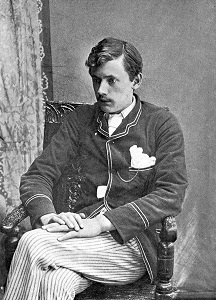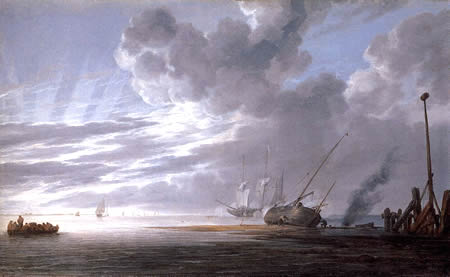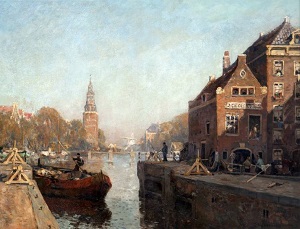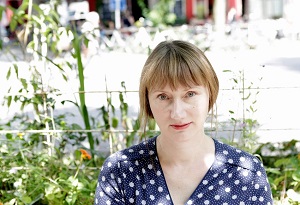De Engelse dichter Ernest Christopher Dowson werd geboren op 2 augustus 1867 in Lee, een wijk in het zuidoosten van Londen. Zijn kinderjaren en jeugd bracht Ernest Dowsen voornamelijk buiten Engeland door. Zijn vader woonde voornamelijk in Frankrijk en aan de Riviera. In 1886 ging hij naar het Queen’s College, Oxford, waar hij ongeveer anderhalf jaar studeerde en vertrok vervolgens naar Londen. Met uitzondering van zijn laatste levensjaren bracht hij het grootste deel van zijn tijd in Frankrijk door. Dowson overleed op 23 februari 1900 in Catfort (zuidoostelijk deel van Londen). Hij werd begraven op de rooms-katholieke begraafplaats van Lewisham. Dowsons was een gesleten persoonlijkheid, het was een zachtaardige man, beleefd, elegant, onbaatzuchtig – aan de andere kant vaak onder invloed van alcohol ronduit krankzinnig en totaal onverantwoord. Zijn vader had hem een oude dok in het Oosten van Londen nagelaten, waar hij in een vervallen huis woonde en een frequente gast in de vele kroegen aan de haven was. Dit leven in de pubs en arme wijken werd in Parijs, Dieppe en Brussel voortgezet. Toen zijn gezondheid verslechterde keerde hij terug naar Londen. In de laatste weken van zijn leven nam een vriend hem op in een slechte woning. In 1894, nadat zijn vader aan tuberculose was overleden en zijn moeder zich had opgehangen, bekeerde hij zich tot het katholicisme, – Maar misschien was de aanleiding ook een ongelukkige liefdesaffaire. De liefde voor een meisje, waarvoor hij het grootste deel van zijn verzen schreef bleef onvervuld. Dowson heeft een klein poëtisch oeuvre nagelaten. In 1896 verscheen de kleine bundel “Verses”, in 1897 “The Pierrot of the minute : a dramatic phantasy in one act” en in 1899 “Decorations in Verse and Prose”. Naast deze gedichtbundels hij een klein bundel korte verhalen en ander proza. Samen met Arthur Moore schreef hij twee romans. Hij vertaalde « Pucelle » van Voltaire en van Choderlos de Laclos « Les Liaisons Dangereuses ». Aubrey Beardsley ïllustreerde Dowsons “The Pierrot of the minute”. Dowson werd zeer gewaardeerd door Stefan George. Hij droeg zijn gedicht “Juli-Schwermut” aan hem op en vertaalde drie van zijn gedichten in het Duits. Arnold Schoenberg zette het gedicht “Séraphita” op muziek.
Non Sum Qualis Eram Bonae Sub Regno Cynarae
Last night, ah, yesternight, betwixt her lips and mine
There fell thy shadow, Cynara! thy breath was shed
Upon my soul between the kisses and the wine;
And I was desolate and sick of an old passion,
Yea, I was desolate and bowed my head:
I have been faithful to thee, Cynara! in my fashion.
All night upon mine heart I felt her warm heart beat,
Night-long within mine arms in love and sleep she lay;
Surely the kisses of her bought red mouth were sweet;
But I was desolate and sick of an old passion,
When I awoke and found the dawn was gray:
I have been faithful to thee, Cynara! in my fashion.
I have forgot much, Cynara! gone with the wind,
Flung roses, roses riotously with the throng,
Dancing, to put thy pale, lost lilies out of mind;
But I was desolate and sick of an old passion,
Yea, all the time, because the dance was long:
I have been faithful to thee, Cynara! in my fashion.
I cried for madder music and for stronger wine,
But when the feast is finished and the lamps expire,
Then falls thy shadow, Cynara! the night is thine;
And I am desolate and sick of an old passion,
Yea, hungry for the lips of my desire:
I have been faithful to thee, Cynara! in my fashion.
Seraphita
Come not before me now, O visionary face!
Me tempest-tost, and borne along life’s passionate sea;
Troublous and dark and stormy though my passage be;
Not here and now may we commingle or embrace,
Lest the loud anguish of the waters should efface
The bright illumination of thy memory,
Which dominates the night; rest, far away from me,
In the serenity of thine abiding place!
But when the storm is highest, and the thunders blare,
And sea and sky are riven, O moon of all my night!
Stoop down but once in pity of my great despair,
And let thine hand, though over late to help, alight
But once upon my pale eyes and my drowning hair,
Before the great waves conquer in the last vain fight.
To One In Bedlam
With delicate, mad hands, behind his sordid bars,
Surely he hath his posies, which they tear and twine;
Those scentless wisps of straw, that miserably line
His strait, caged universe, whereat the dull world stares,
Pedant and pitiful. O, how his rapt gaze wars
With their stupidity! Know they what dreams divine
Lift his long, laughing reveries like enchanted wine,
And make his melancholy germane to the stars’?
O lamentable brother! if those pity thee,
Am I not fain of all thy lone eyes promise me;
Half a fool’s kingdom, far from men who sow and reap,
All their days, vanity? Better than mortal flowers,
Thy moon-kissed roses seem: better than love or sleep,
The star-crowned solitude of thine oblivious hours!

Ernest Dowson (2 augustus 1867 – 23 februari 1900)
Bewaren





